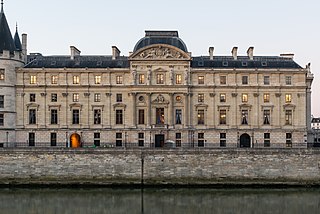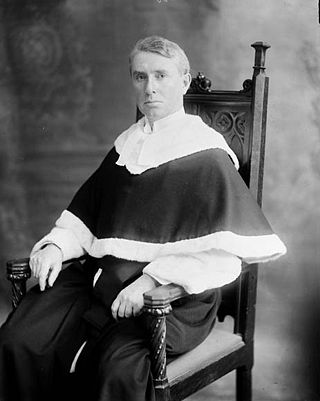A divisional court, in relation to the High Court of Justice of England and Wales, means a court sitting with at least two judges. [1] Matters heard by a divisional court include some criminal cases in the High Court (including appeals from magistrates' courts and in extradition proceedings) as well as certain judicial review cases. Although often referred to in practice as the Divisional Court, a divisional court is in fact not a separate court or division of the High Court but essentially refers to the number of judges sitting. Usually a divisional court sits with two judges but occasionally the bench comprises three judges. [2]
The best known divisional court is that of the Administrative Court, which is a specialist court in the King's Bench Division which deals with judicial review claims, some criminal appeals (including by case stated) and writs of habeas corpus. [2] There are also divisional courts of the Family and Chancery Divisions to deal with certain cases.
The usual constitution of a divisional court is one Lord Justice of Appeal and one High Court judge, in comparison to other sittings of the High Court which are usually before a single High Court judge.

A judge is a person who presides over court proceedings, either alone or as a part of a panel of judges. In an adversarial system the judge hears all the witnesses and any other evidence presented by the barristers or solicitors of the case, assesses the credibility and arguments of the parties, and then issues a ruling in the case based on their interpretation of the law and their own personal judgment. A judge is expected to conduct the trial impartially and, typically, in an open court.

The Court of Appeal is the highest court within the Senior Courts of England and Wales, and second in the legal system of England and Wales only to the Supreme Court of the United Kingdom. The Court of Appeal was created in 1875, and today comprises 39 Lord Justices of Appeal and Lady Justices of Appeal.

The Court of Cassation is the supreme court for civil and criminal cases in France. It is one of the country's four apex courts, along with the Council of State, the Constitutional Council and the Jurisdictional Disputes Tribunal.
The Courts of England and Wales, supported administratively by His Majesty's Courts and Tribunals Service, are the civil and criminal courts responsible for the administration of justice in England and Wales.

The term magistrate is used in a variety of systems of governments and laws to refer to a civilian officer who administers the law. In ancient Rome, a magistratus was one of the highest ranking government officers, and possessed both judicial and executive powers. In other parts of the world, such as China, magistrate is a word applied to a person responsible for administration over a particular geographic area. Today, in some jurisdictions, a magistrate is a judicial officer who hears cases in a lower court, and typically deals with more minor or preliminary matters. In other jurisdictions, magistrates are typically trained volunteers appointed to deal with criminal and civil matters in their local areas.

Court dress comprises the style of clothes and other attire prescribed for members of courts of law. Depending on the country and jurisdiction's traditions, members of the court may wear formal robes, gowns, collars, or wigs. Within a certain country and court setting, there may be many times when the full formal dress is not used. Examples in the UK include many courts and tribunals including the Supreme Court of the United Kingdom, and sometimes trials involving children.

The High Court of Justiciary is the supreme criminal court in Scotland. The High Court is both a trial court and a court of appeal. As a trial court, the High Court sits on circuit at Parliament House or in the adjacent former Sheriff Court building in the Old Town in Edinburgh, or in dedicated buildings in Glasgow and Aberdeen. The High Court sometimes sits in various smaller towns in Scotland, where it uses the local sheriff court building. As an appeal court, the High Court sits only in Edinburgh. On one occasion the High Court of Justiciary sat outside Scotland, at Zeist in the Netherlands during the Pan Am Flight 103 bombing trial, as the Scottish Court in the Netherlands. At Zeist the High Court sat both as a trial court, and an appeal court for the initial appeal by Abdelbaset al-Megrahi.
The court system of Canada is made up of many courts differing in levels of legal superiority and separated by jurisdiction. In the courts, the judiciary interpret and apply the law of Canada. Some of the courts are federal in nature, while others are provincial or territorial.
The Superior Court of Justice is a superior court in Ontario. The Court sits in 52 locations across the province, including 17 Family Court locations, and consists of over 300 federally appointed judges.

The Judiciary of the Hong Kong Special Administrative Region is the judicial branch of the Hong Kong Special Administrative Region. Under the Basic Law of Hong Kong, it exercises the judicial power of the Region and is independent of the executive and legislative branches of the Government. The courts in Hong Kong hear and adjudicate all prosecutions and civil disputes, including all public and private law matters.

The courts of Scotland are responsible for administration of justice in Scotland, under statutory, common law and equitable provisions within Scots law. The courts are presided over by the judiciary of Scotland, who are the various judicial office holders responsible for issuing judgments, ensuring fair trials, and deciding on sentencing. The Court of Session is the supreme civil court of Scotland, subject to appeals to the Supreme Court of the United Kingdom, and the High Court of Justiciary is the supreme criminal court, which is only subject to the authority of the Supreme Court of the United Kingdom on devolution issues and human rights compatibility issues.

In England and Wales, a magistrates' court is a lower court which hears matters relating to summary offences and some triable either-way matters. Some civil law issues are also decided here, notably family proceedings. In 2010, there were 320 magistrates' courts in England and Wales; by 2020, a decade later, 164 of those had closed. The jurisdiction of magistrates' courts and rules governing them are set out in the Magistrates' Courts Act 1980.

A Lord Justice of Appeal or Lady Justice of Appeal is a judge of the Court of Appeal of England and Wales, the court that hears appeals from the High Court of Justice, the Crown Court and other courts and tribunals. A Lord Justice of Appeal is the second highest level of judge in the courts of England and Wales. Despite the title, and unlike the former Lords of Appeal in Ordinary, they are not peers.

The lowest courts in the Isle of Man are the summary courts, Coroner of Inquests, Licensing Court, Land Court, etc. These courts are presided over by magistrates. There are two stipendiary magistrates, the High Bailiff and the Deputy High Bailiff, along with lay justices of the peace.

There are various levels of judiciary in England and Wales—different types of courts have different styles of judges. They also form a strict hierarchy of importance, in line with the order of the courts in which they sit, so that judges of the Court of Appeal of England and Wales are given more weight than district judges sitting in county courts and magistrates' courts. On 1 April 2020 there were 3,174 judges in post in England and Wales. Some judges with United Kingdom-wide jurisdiction also sit in England and Wales, particularly Justices of the United Kingdom Supreme Court and members of the tribunals judiciary.
The Court of King's Bench of Manitoba —or the Court of Queen’s Bench of Manitoba, depending on the monarch—is the superior court of the Canadian province of Manitoba.
A full court is a court of law sitting with a greater than normal number of judges. For a court which is usually presided over by one judge, a full court has three or more judges; for a court which, like many appellate courts, normally sits as a bench of three judges, a full court has a bench of five judges.

The High Court of Justice in London, known properly as His Majesty's High Court of Justice in England, together with the Court of Appeal and the Crown Court, are the Senior Courts of England and Wales. Its name is abbreviated as EWHC for legal citation purposes.

In England and Wales, magistrates are trained volunteers, selected from the local community, who deal with a wide range of criminal and civil proceedings. They are also known as Justices of the Peace. In the adult criminal court, magistrates decide on offences that carry up to twelve months in prison, or an unlimited fine. Magistrates also sit in the family court where they help resolve disputes that involve children, and in the youth court, which deals with criminal matters involving young people aged 10-17. Established over 650 years ago, the magistracy is a key part of the judiciary of England and Wales, and it is a role underpinned by the principles of 'local justice' and 'justice by one's peers'.

The King's Bench Division of the High Court of Justice deals with a wide range of common law cases and has supervisory responsibility over certain lower courts.